
Metallic Epoxy Floor | Top Flooring for Florida Homes & Garages
Upgrade your space with a metallic epoxy floor. Perfect for Florida garages and homes. Get

July 31, 2024
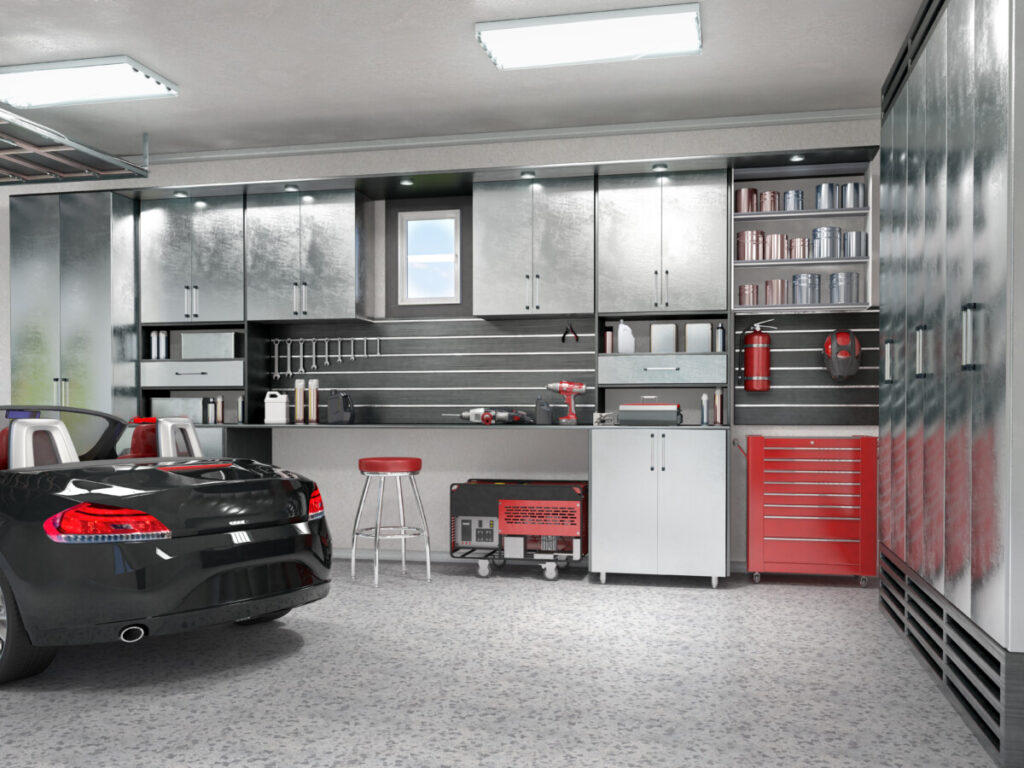
Garages endure a lot of wear and tear, from the weight of vehicles to exposure to chemicals and heavy foot traffic.
In a survey from Home Innovation Research Labs, over 85% of homeowners report experiencing significant damage to their garage floors within the first five years. The primary reason was due to the daily pressures of vehicle storage, heavy equipment, and chemical spills.
Given this, choosing the right floor covering is essential to ensure your garage remains functional and appealing for years. While traditional flooring options like concrete, vinyl, and tile have been staples for many, epoxy flooring has emerged as a superior alternative.
In this blog, we’ll compare the performance of epoxy garage flooring with traditional options to help you decide which fits your needs.
Epoxy flooring is a robust and durable surface created by applying multiple layers of epoxy resin onto a prepared concrete substrate. This resin, a combination of polymer resins and hardeners, chemically bonds to the concrete to form a rigid plastic material.
This combination results in a high-gloss finish that can withstand heavy loads and resist external damage. Below are the additional benefits of using epoxy flooring for garages:
Aside from residential applications for garages, it is also commonly used in commercial and industrial applications. This includes warehouses, factories, and retail space floor projects.
Traditional garage flooring refers to commonly used materials such as concrete, vinyl, and tile. These materials have been popular choices for garages due to their availability and initial affordability.
Let’s outline the benefits of each material
While traditional garage flooring options have their advantages, they often fall short in terms of functionality. This is an important factor that every garage floor should offer to ensure sustainability. We will be discussing more of this in the following section.
While they offer certain benefits, these materials also come with notable drawbacks that make them less superior compared to garage floor epoxies. Here’s why:
Traditional flooring options like concrete, vinyl, and tile are prone to cracking and damage from heavy loads and wear. These materials often require frequent repairs and replacements to maintain their functionality and appearance.
Concrete floors need regular sealing and cleaning to prevent dusting and staining. Tile and vinyl floors demand constant attention to grout lines and surface integrity.
Traditional flooring options generally lack the modern, polished look that solid epoxy flooring provides. Concrete can appear dull, tiles may not align perfectly, and vinyl can sometimes look cheap.
Traditional flooring might have lower initial costs, but their long-term expenses can add up. Frequent maintenance, repairs, and replacements make them less cost-effective over time.
Concrete production has high carbon emissions, and vinyl manufacturing involves non-renewable resources and harmful chemicals. Garage Floor epoxy coatings are often more sustainable, with a longer lifespan reducing waste.
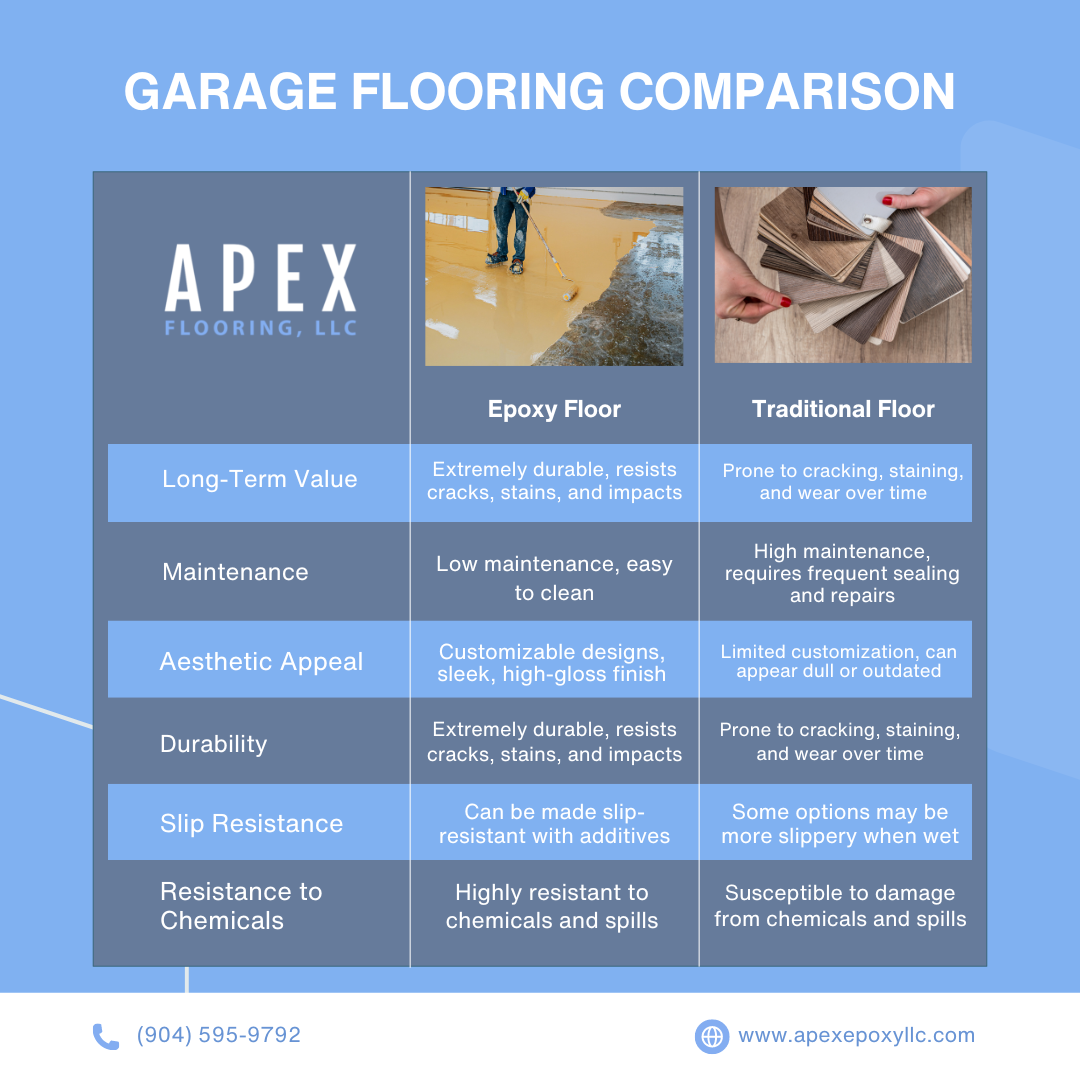
Your budget is a crucial factor in deciding the best epoxy types for your garage. While traditional options may have lower initial costs, epoxy flooring offers long-term value with its durability and minimal maintenance requirements.
Consider how you use your garage. If it doubles as a workshop or sees heavy traffic, epoxy flooring’s resistance to impacts, chemicals, and stains makes it a superior choice. For lighter use, traditional options might suffice.
Your personal style and the desired look for your garage will influence your choice. Epoxy flooring provides a sleek, high-gloss finish with a wide variety of colors and patterns, whereas traditional flooring options offer a more classic look.
Think about the longevity and maintenance of your flooring. Epoxy flooring requires less upkeep and has a longer lifespan compared to traditional options, making it a more practical investment for the future.
Seeking advice from flooring experts can help you make an informed decision. Apex Epoxy Flooring offers consultations to evaluate your specific needs and recommend the best solution for your garage.
In the end, the right flooring choice for your garage should offer durability, ease of maintenance, and great value for your investment. While traditional floorings have their merits, epoxy garage floor coating options excel in all these aspects.
If you’re looking to transform your garage into a high-performing, attractive space, consider epoxy flooring. This material stands out with its exceptional durability, stain resistance and chemicals, easy maintenance, and customizable aesthetics.
At Apex Epoxy Flooring, we are dedicated to providing high-quality epoxy flooring solutions tailored to your specific requirements. Contact us today for a consultation and take the first step towards top-notch installation services to meet your needs.
Epoxy flooring can last anywhere from 10 to 20 years on a garage floor, depending on factors like the quality of installation, the level of foot and vehicle traffic, and maintenance practices. Regular cleaning and occasional resealing can extend its lifespan. With proper care, epoxy floors can remain durable and visually appealing for many years.
The longest-lasting garage floor covering is epoxy flooring. It offers exceptional durability, and resistance to heavy loads, chemicals, and abrasions, making it ideal for high-traffic and demanding environments. With minimal maintenance and a lifespan that can exceed several decades, epoxy flooring outperforms traditional options like concrete, vinyl, and tile in terms of longevity.
Epoxy garage floor coating can be slippery when wet, especially if it has a glossy finish. However, this can be mitigated by adding non-slip additives to the epoxy mixture during installation, providing a textured surface for better traction. At Apex Epoxy Flooring, we offer solutions to ensure your epoxy floor remains safe and abrasion resistant.
Typically, a garage floor requires at least two coats of epoxy for optimal durability and appearance. The first coat acts as a primer, sealing the concrete and providing a solid base, while the second coat adds color, thickness, and protection. For additional durability and a smoother finish, a third topcoat may be applied.
Yes, you can epoxy your garage floor yourself, but it requires careful preparation and the right materials. The process involves cleaning and repairing the concrete, applying a primer, and then multiple layers of epoxy, which can be time-consuming and labor-intensive. For the best results and a professional finish, you might consider hiring a professional service like Apex Epoxy Flooring.
Written By:
Rachel Kim, from Northwestern University’s journalism school, excels in making complex technical topics accessible. Her focus on the benefits and customer information of epoxy floors over the past 15 years has helped many readers understand how to choose and care for their flooring investments effectively.

Upgrade your space with a metallic epoxy floor. Perfect for Florida garages and homes. Get
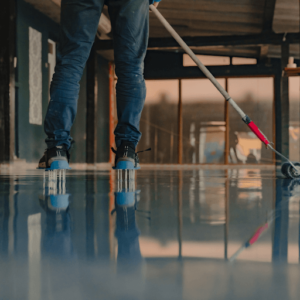
Transform your home with a durable epoxy resin garage floor in just one day. Follow
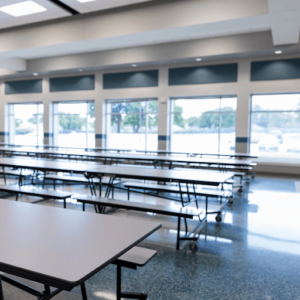
Transform your home with a durable epoxy resin garage floor in just one day. Follow
Get In Touch
Get a Free Epoxy Flooring Estimate
Providing epoxy flooring services for homes & businesses across Florida, Atlanta GA, and Charleston SC.
Quick Links
Copyright © 2025 Apex Flooring, LLC, All Rights Reserved.

For just $2,700, give your 3-car garage a professional epoxy flooring finish backed by our lifetime warranty. Fill out this form below to take advantage of this limited time offer!
For just $2,300, give your 2-car garage a professional epoxy flooring finish backed by our lifetime warranty. Fill out this form below to take advantage of this limited time offer!
For just $2,700, give your 3-car garage a professional epoxy flooring finish backed by our lifetime warranty. Fill out this form below to take advantage of this limited time offer!
For just $2,300, give your 2-car garage a professional epoxy flooring finish backed by our lifetime warranty. Fill out this form below to take advantage of this limited time offer!
Ready to upgrade your garage with Apex Epoxy Flooring? Fill out the form below, and let us handle the rest. Whether it’s a 2-car or 3-car garage, we’re here to deliver top-notch service.